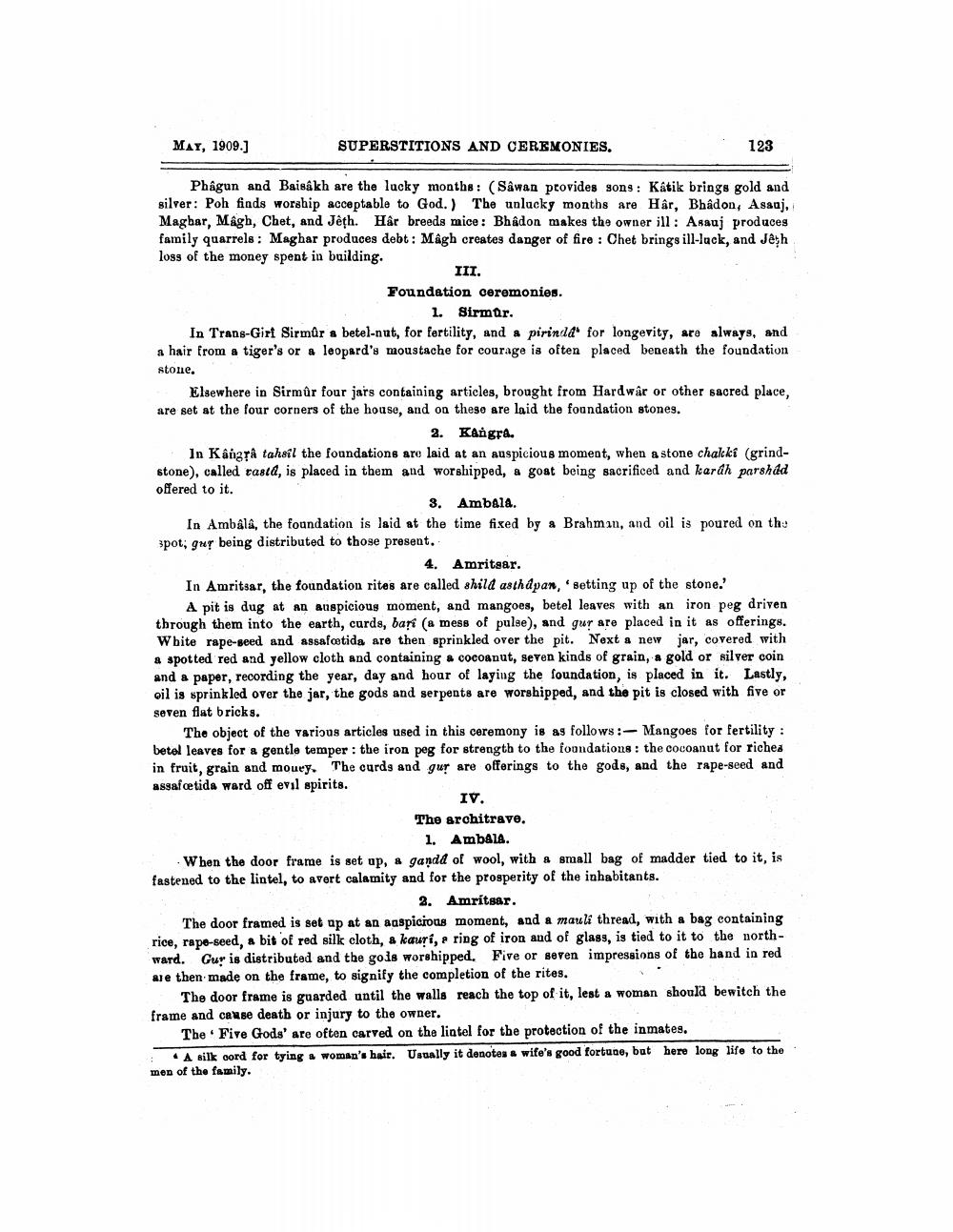________________
MAY, 1909.)
SUPERSTITIONS AND CEREMONIES.
123
Phagun and Baisakh are the lucky months: (Sawan provides sons : Katik brings gold and silver: Poh finds worship acceptable to God.) The unlucky months are Hâr, Bhadon, Assaj, Magbar, Magh, Chet, and Jeth. Hâr breeds mice: Bhadon makes the owner ill: Anauj produces family quarrels : Maghar produces debt: Mâgh creates danger of fire : Chet brings ill-luck, and Jesh loss of the money spent in building.
III. Foundation ceremonies.
1. Sirmtr. In Trans-Girt Sirmûr a betel-nut, for fertility, and a pirinda for longevity, are always, and a hair from a tiger's or a leopard's moustache for courage is often placed beneath the foundation stone.
Elsewhere in Sirmûr four jars containing articles, brought from Hardwar or other sacred place, are set at the four corners of the house, and on these are laid the foundation stones.
2. Kangra. In Kangrå tahsil the foundations are laid at an auspicious moment, when a stone chakki (grindstone), called rastá, is placed in them and worshipped, a goat being sacrificed and karáh parshad offered to it.
3. Ambala. In Ambala, the foundation is laid at the time fixed by a Brahman, and oil is poured on the spot, gres being distributed to those present.
4. Amritsar. In Amritsar, the foundation rites are called shild asthapan, setting up of the stone.'
A pit is dug at an auspicious moment, and mangoes, betel leaves with an iron peg driven through them into the earth, curds, bari (a mess of pulse), and gur are placed in it as offerings. White rape-seed and assafoetida are then sprinkled over the pit. Next a new jar, covered with a spotted red and yellow cloth and containing a cocoanut, seven kinds of grain, a gold or silver coin and a paper, recording the year, day and hour of laying the foundation, is placed in it. Lastly, oil is sprinkled over the jar, the gods and serpents are worshipped, and the pit is closed with five or seven flat bricks.
The object of the various articles used in this ceremony is as follows:- Mangoes for fertility : betel leaves for a gentle temper : the iron peg for strength to the foundations: the cocoanut for riches in fruit, grain and mouey. The curds and gur are offerings to the gods, and the rape-seed and assalcetida ward off evil spirits.
IV. The architrave.
1. Ambala When the door frame is set up, & gandd of wool, with a small bag of madder tied to it, is fastened to the lintel, to avert calamity and for the prosperity of the inhabitants.
2. Amritsar. The door framed is set up at an auspicious moment, and a mauli thread, with a bag containing rice, rape-seed, a bit of red silk cloth, a kaurí, - ring of iron and of glass, is tied to it to the northward. Guy is distributed and the gols worshipped. Five or seven impressions of the hand in red ale then made on the frame, to signify the completion of the rites.
The door frame is guarded until the walls reach the top of it, lest a woman should bewitch the frame and can be death or injury to the owner.
The Five Gods' are often carved on the lintel for the protection of the inmates,
A silk cord for tying a woman's hair. Usually it denotes a wife's good fortune, but here long life to the men of the family.




